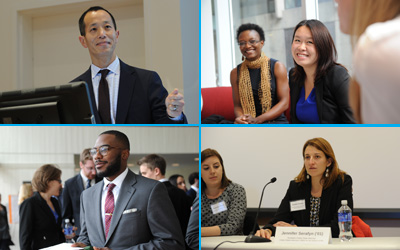First-Year Career Conference Offers Practical Advice and Broad Exposure
Deputy Attorney General Colin Owyang delivered the keynote, while BU Law faculty and alumni joined panels with Boston-area practitioners to offer advice.

The Boston University School of Law Class of 2018 kicked off their career search Friday, October 23, 2015, with a keynote address by Colin Owyang, deputy attorney general in the Massachusetts Attorney General’s Office, who mixed fact and fiction to show students a few great ways to start—and develop—their careers. Contrasting modern life and practice with that depicted in 1950s popular culture, he encouraged students to not think of their careers as choosing between becoming either June or Ward Cleaver; instead, he said, they can switch back and forth, with different goals at different points, as their lives change and evolve.
Owyang related his own career trajectory to illustrate just one of the many possible paths these future lawyers might take. A Yale University and University of Michigan Law School graduate, Owyang served as a judicial clerk to three US District Court judges, and recommended clerking as a great way to learn about the courts. Other career highlights include roles as an assistant US attorney in Boston, special assistant US attorney in Washington, DC, trial attorney at the US Department of Justice, and senior vice president and US general counsel for National Grid.
Prior to the keynote, BU Law Dean Maureen O’Rourke introduced students to the 1L Career Conference, which offered, she said, opportunities for students who, like her, don’t come from families of lawyers who can advise them “what to do, where to go, and how to act.” The day would culminate, she said, in “a stress-free opportunity to network” with alumni attorneys. Among other resources students should take advantage of at this event, she added, was practical advice from attorneys who regularly conduct interviews.
Assistant Dean for Career Development & Public Service Fiona Trevelyan Hornblower added her expertise to the event. As she presented a list of dozens of fields in which law school graduates might practice, she noted that an attorney is likely to practice in a variety of areas, sometimes sequentially, sometimes simultaneously. She urged students to be intentional about planning their time in school and their job searches, encouraging them to think of the practice area they are most interested in, then the practice setting, the work environment and style, and finally the skills needed and the hiring criteria likely to be valued by potential employers. “Realistically assess where your strengths and weaknesses are,” she said, “and think about where you may need to build skills.”
Explore, Focus, Refine, Iterate
Dovetailing with Hornblower’s remarks, Owyang noted that not knowing where to start is not an insurmountable problem. “However,” he said, “it’s never too early to start thinking about your future.” He urged students to consider the first year of law school as one of the best times of a law student’s life, because the many choices available to them will soon start to winnow. “Remember that you can—and will, and are expected to—do more” with your life than just succeed in your career, he said, pointing to Michelle Obama and Steve Jobs as two wildly different ways to succeed, as well as two wildly different work-life balance decisions.
The modern practice of law is a cycle, Owyang noted, rotating among four stages: “explore, focus, refine, iterate.” The first year of law school is a time to explore, he advised. In your early career, “you’ll be asked to focus more than you ever have before,” he told students. And just as that’s picking up speed, you’ll need to refine your skills—just when you’re asking yourself, “Isn’t this the time when I thought I’d be settling down?” And the cycle continues.
Stressing the importance of networking, Owyang encouraged even introverted students to go into networking events with a goal in mind: a minimum number of contacts to meet, and a minimum number of follow-up calls to make afterward. “Be pleasantly persistent about it,” he said, “and someone will help you. And later in life, you will help someone along the way as well.”
He concluded with a few practical tips: Take classes oriented toward your interests, or based on others’ advice if you’re not sure of your interests; keep networking; “learn to love interviewing”; and consider clerking a “no-lose proposition,” even if it means “eking it out for a year on ramen” given the clerkship salary.
No matter where you wind up, Owyang said, “You have to make it work for you.” In the end, “You can, will, and must go further than anyone has before.”
Practice Area-Focused Panels
After the keynote, students split into multiple sessions for practice area-focused panel presentations. covering transactional law, criminal law, international law, litigation, regulatory law, and social justice. Students heard from faculty, alumni, and practitioners about course offerings, career paths and experiences, and how to best plan their law school career. At the end of each panel students were able to ask questions of the panelists and learn more about their potential future careers. Breaks between sessions offered students the opportunity to make connections and get to know panelists a little better.
The day’s events concluded with the networking reception, attended by panelists as well as additional BU Law alumni, all eager to help students succeed.